#wingwatcher's toolkit
Explore tagged Tumblr posts
Text
Heero Yuy: Does Not And Has Never Known What Is Going On
Pilot Spice Rating: | 🌶🌶🌶🌶🌶|
I need everyone here to understand one extremely important thing: Heero Yuy does not think.
Heero Yuy reacts. He reacts instantly to stimuli because he is not thinking. This leads a lot of people to believe he’s some kind of savant, but in fact he is purposefully, intentionally, not having thoughts. He does not calculate his actions based on any consequences beyond the necessary outcome. Sometimes, this gets him into trouble. But mostly, it keeps him alive.
And let’s be clear: it's not because he can't think ahead. Not thinking about things is his primary self-defense mechanism; this is a deeply traumatized child soldier, who lives in perpetual hyper-awareness of his own expendability. He is never thinking about tomorrow, because he might be dead before then.
So why does he know how to do so many things? He really doesn’t. If it looks like he knows what he’s doing, it’s because he’s failing so nonchalantly that it looks like confidence. People are constantly doing the work for him by assuming he’s ultra-competent at everything he does. Heero is a cipher that everyone projects their ideas and feelings onto.
He was trained at a young age to assimilate himself into new environments through observation and imitation– which he’s very good at, so he doesn’t HAVE to know things. If he needs to learn something new, he can pick it up fast on the fly, or just make whatever it is work by brute force.
If you see a nail and you don’t have a hammer: get creative.
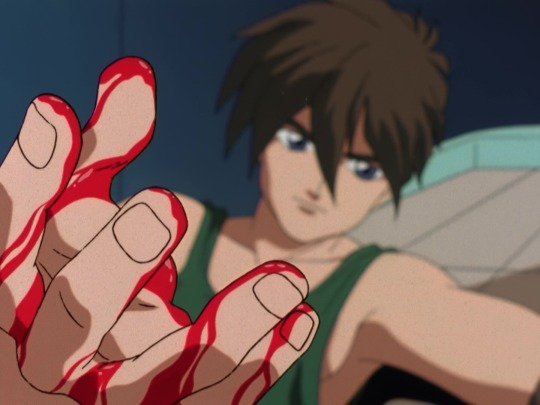
Okay, but how come he always seems to know exactly what’s going on? He has a smart guy in his ear telling him what to do. Later, he has an insidious AI program in his ear telling him what to do. And the rest of the time he is literally winging it (pun intended) and hoping things will turn out okay if he just keeps at it long enough.
Really, Heero doesn’t need to know what’s going on, and he only needs to be good at ONE thing, which is his solution to everything: keep going.
When he doesn’t have a clear mission objective, he is following his motto: “do what your heart tells you” / “act on your emotions”-- which is way, way less whimsical and than it sounds (see this entry in the Dictionary section). It’s an extension of the Unthinking: You encounter a problem, you find a solution. Does this feel right? If yes, proceed. If no, then don’t. Was it the wrong solution? Well, that’s a new problem.
If you’re Heero’s problem, you have a very limited window of opportunity to change his mind about it. If you’re Relena, you get another chance. If you’re Marshal Noventa, you don’t. If you’re a fellow Gundam pilot, you might be able to hold him off long enough for the problem to become a different problem.
Heero was built from the ground up several times by the people who found him and turned him into what he is: a weapon that you aim and fire. That’s how he thinks of himself, as a machine with a single purpose that you input instructions into, and when he stops working at peak performance, he’ll die and be replaced.
But the people who were there for his “training” know that there was a human boy underneath that they buried to make their perfect soldier. Sometimes, you can still see him through the cracks.
There are only a few times in canon when we see Heero laugh or smile; I found it a very interesting case study to track when and where he does so. In chronological order, the first time is in a flashback from Endless Waltz; it’s a very memorable scene, because it’s the most innocent and carefree we ever see him, but the thing he was doing directly before flopping onto the grass and laughing wholesomely was planting explosives in a military base. The outcome of this scene is a defining tragedy of his life, which we know was the cause of his needing to be “retrained”.
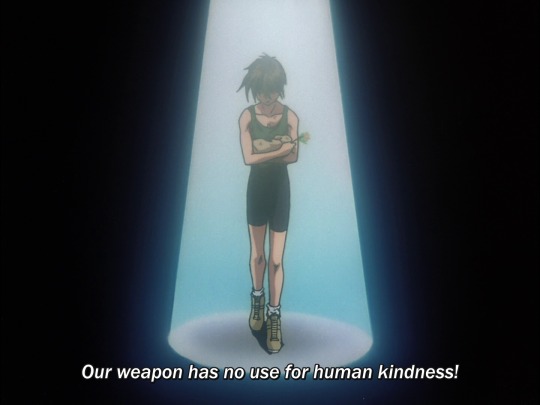
The other few times he laughs are sometime after this incident, when he first arrives on Earth.
In episode one, we get to see him smile and laugh. The smile is one of simple relief, because he’s completed his objective– but what he actually considers that objective to be is a bit complicated. The simplest answer is that he’s successfully made it from the Colonies to Earth, so he can start his mission as a resistance fighter, but the more relevant answer is that arriving on Earth has the potential to be his FINAL mission as the person who stole the Gundam in order to interrupt Operation Meteor. The smile is either because he’s made it past the first difficult step of his journey, or because this is where his journey can finally end.
In this same episode, he laughs after making his first kill; hapless OZ pilots who had no idea what they were up against. Later on, he laughs because he completes a mission after repairing his Wing Gundam with the cannibalized parts of Duo’s Gundam, Deathscythe. Another time, he smiles with an aloof assurance that he does not need to participate in the frivolities of civilian life, as if he’s confirming to himself that he is not like the people he is infiltrating. He’s a robot, disguised as one of them. He doesn’t need to worry about understanding them, or sympathizing with them, or trying to form emotional connections that he isn’t capable of making. He smiles when he cuts down what he thinks is an OZ carrier leaving New Edwards Base.
These are all times when Heero feels like he’s gotten away with something; when he’s pulled off something sneaky and gotten away scot free. It’s a cathartic release of excitement that's a touch mischievous; the surviving traces of his adolescence bubbling up and escaping containment.
Heero doesn’t laugh again after his first failed mission at New Edwards. Even when he cracks a joke, even when he's relaxed, his face remains frozen. There's only one more time when he smiles: when he’s sure he’s on his last mission, the one he won’t come back from, and he knows he has someone he wants to protect.
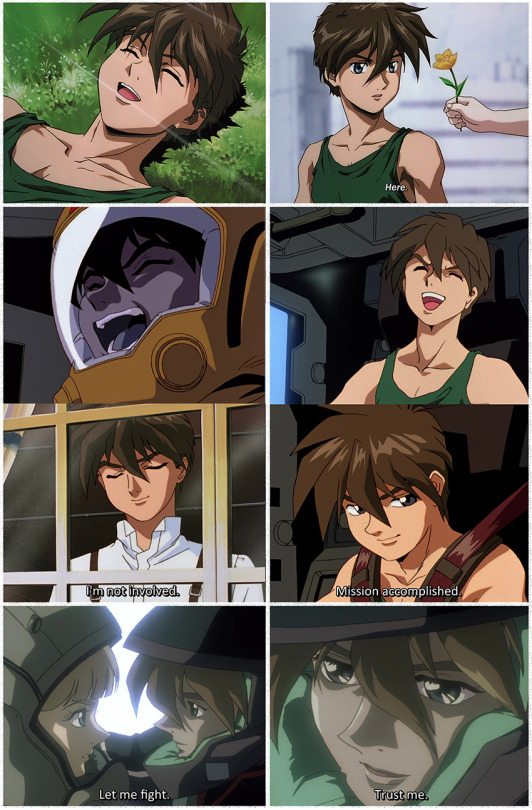
It is such a simple, kind, naive thing that lets Heero unlock the capacity to feel; he’s never had someone be on his side before. Just… decide that they care about him, for no reason in particular– indeed, after he’d given them ample reason NOT to. It’s not perfect, not a clean process, not all at once. He gets feelings back one at a time, in broken pieces that are sharp and don’t make sense at first. A girl who he thought he would have to kill decided that she would trust him absolutely and have his back no matter what, and that made everything uncertain.
It’s more complicated to live with danger when there’s something to live for, when someone insists that you’re worth saving. It means you have to think about the future sometimes, and that means dealing with consequences, and disappointment, and worry, and pain. It means having to develop a sense of compassion, without which it would be so easy to just turn off, and listen to the comforting absolutes of a machine that tells you how to win and who to kill.
Having something, someone, to lose is frightening– but it gives you a fixed point in the sky to follow, so when you’re facing down ultimatums, and sacrifices, and uncertainty, “winning” becomes less important than keeping who you care about safe.
It makes your heart a much better compass to follow.

164 notes
·
View notes
Text
The ZERO System- Why you shouldn’t let a battle algorithm determine your life goals
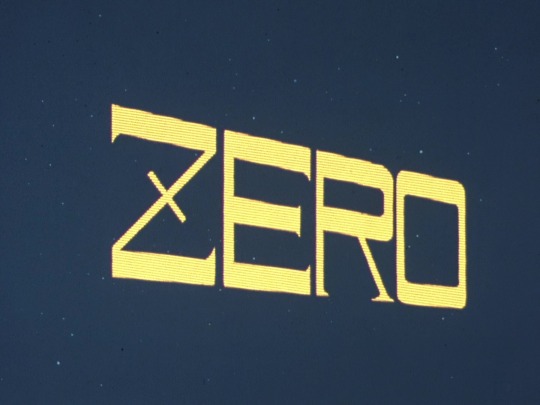

-Arrival (2016)
The ZERO system is a program that interfaces between a pilot and a Mobile Suit.
The purpose of the system is to enhance a pilot’s natural abilities by increasing their reaction time and accuracy, even allowing the pilot to “feel” the response of their Mobile Suit as though it were an extension of their own body, and to provide an adaptive, real-time battle plan that suggests the most advantageous course of action based on accumulated battle data and iterative projections of likely outcomes.
How exactly the ZERO system does all this is a little unclear– but we do know that it’s open-source, DRM free, and runs off a floppy disc.
The future is the 90’s!
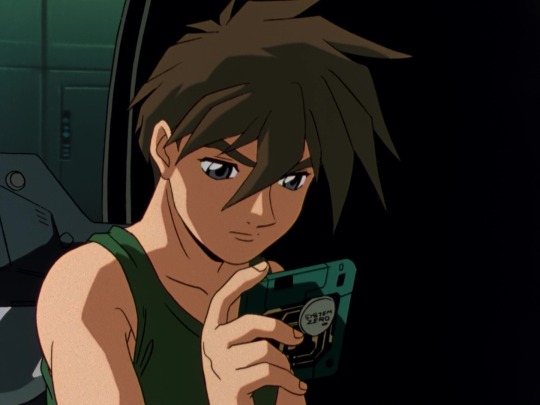
--To start off with a quick overview, there are two mobile suits installed with a permanent copy of the ZERO system: the Wing Zero, which has it built into the cockpit, and the Epyon, which displays the system data via a flight suit helmet (technically the Epyon’s system was reverse-engineered without the benefit of the original ZERO program, but its effects are identical). There is also a modified version of the system that was utilized to coordinate the movements of Libra's mobile doll fleet– a novel use of the technology that elevated the otherwise limited AI of the Dolls to monstrous effect by giving them the intuition and oversight of a human mastermind.
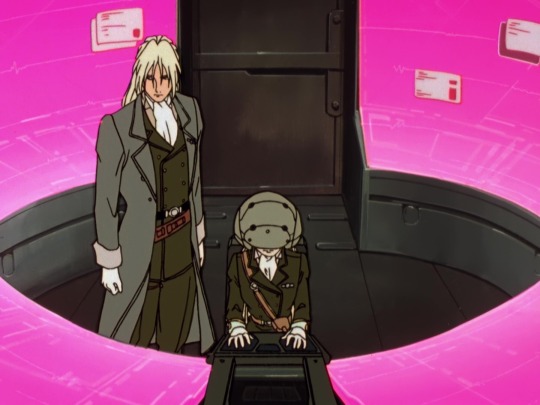
But! Something worth noting is that the ZERO system isn’t the only battle-enhancing algorithm for mobile suits!
In a brief but significant moment in episode 10, we learn that OZ has a machine-learning program all of its own, and it's installed on the (then newly developed) Taurus mobile suits.
“There is a problem with the Taurus. It has the ability to learn from accumulated battle data. I’d like to trust OZ’s control system, but there’s still the chance that the machine will ignore the pilot’s commands and move on its own. If the command to kill overrides the pilot, the consequences could be significant.” –Doctor J
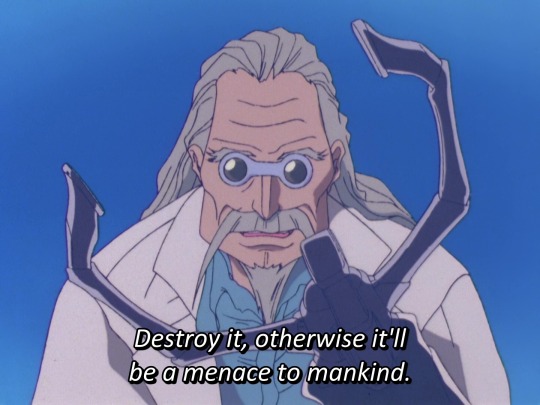
Who wrote the program for the Taurus suits? The most likely answer is Chief Engineer Tuberov, the man responsible for the Mobile Doll AI system, which is no doubt the successor of the Taurus AI. However, there was a lot of cooperation and cross-pollination of ideas between the original creators of mobile suits; Tuberov, Howard, and the five Gundam scientists were all involved in the earliest days of MS development, so it's not inconceivable that Doctor J is aware of the dangers of the Taurus’ AI because he helped develop it.
And Doctor J has good reason to consider the Taurus AI dangerous, because if it’s anything like the ZERO system, it’s the absolute last thing you’d want a power-hungry global military organization to have access to.
It’s not safe in the wrong hands; hell, it’s not even safe in the right hands. There’s a reason ZERO wasn’t installed on the finalized Gundams, and was left buried inside the files of a discarded blueprint.
- ----------------- -
The ZERO system is a GAN : it uses the data sets of previously recorded battles and the pilot's biological feedback to generate potential outcomes for a given fight, and then evaluates those results based on their likelihood and probability of success, in a zero-sum game where "success" is always defined by the total elimination of enemies.
Like all algorithmic processes, it amplifies certain results based on what data it's given and how it is trained; it's possible to use ZERO to predict the most likely, or most advantageous course of action for a pilot's future-- as long as that future is combative. And because the system is only trained to recognize Win States, Enemies, and Vulnerabilities, every future is going to be combative.
It's not trained to look for alternative solutions to combat, or make predictions about a life NOT spent inside a mobile suit-- it can only continue to generate pass/fail scenarios that lead, by the most efficient means, to the ultimate win state: the elimination of all enemies, all future enemies, all potential enemies.
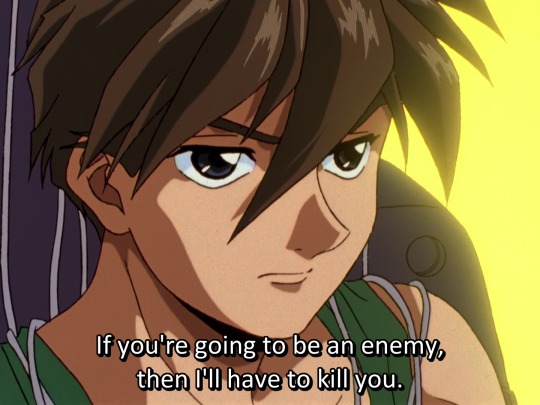
--Whatever the mechanism is that allows the ZERO system to interface with a pilot’s brain, it is possible for a good pilot, who is aware of the system and is prepared for its effects, to mitigate how much control the system has over their mind and body, and successfully moderate the interposition of the machine's priorities and their own-- but it takes an enormous amount of mental and physical conditioning to override ZERO, and the strain on the pilot is significant.
The ZERO system gives a pilot the best chance of success by grabbing them directly by the brain chemistry, heightening awareness, speeding up reflexes, and inducing an almost trance-like state of hyperfocus that eliminates “distractions”, and ignores any physical and mental barriers that might get in the way of victory.
Unfortunately, what constitutes a “distraction” in the eyes of the machine is not always in line with the pilot’s conscience, and what it considers a “weakness” is often the biological feedback of strain and bodily distress. If left unchecked, the system overwhelms the pilot and can make them keep fighting through unsafe levels of exhaustion and injury, and in extreme situations, over-stimulation from the system itself can cause brain hemorrhaging.
While assessing all of the potential outcomes of a given battle, it takes into account every likely scenario up to and including the pilot’s own death. It will tell you if you’re likely to die. It will show you all the ways you are likely to die. If you let it dig too far into your nervous system, it will in fact let you feel how you’ll die, pumping your adrenaline levels up to the screaming pitch you’d experience if it were actually happening.
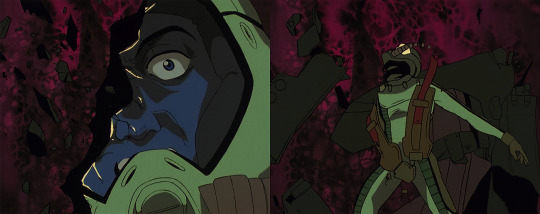
Even if a pilot is technically capable of withstanding ZERO, the psychological effect of using in the first place comes with its own insidious dangers. The temptation to let the machine ride is a powerful one; it makes you faster and stronger than everyone else, it lets you see things before they happen, it allows you to stop thinking about complicated questions of right and wrong and simply focus on the most immediate action necessary for survival and success, it takes away the confusion of competing moral imperatives.
ZERO grants a human the clarity and singularity of purpose of a machine.
For those seeking refuge in numbness, this is a soporific that allows a pilot to take retributive action against their perceived enemy without feeling, removing grief and replacing it with vindication; and for those who are insecure, or weak and hungry for power, it is fatally intoxicating.
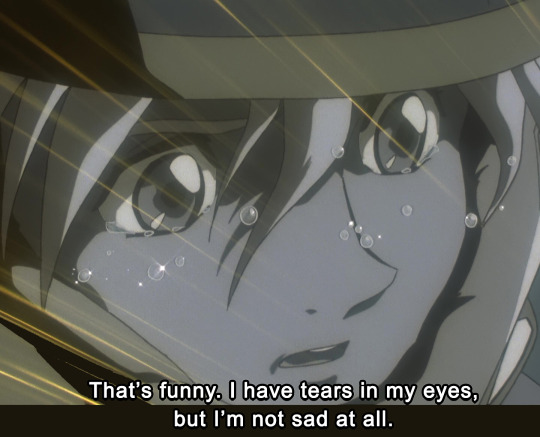
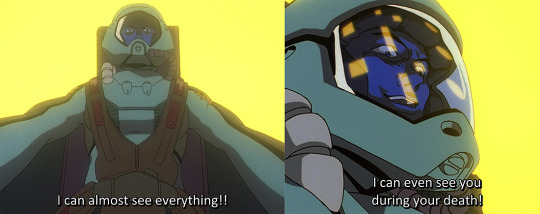
ZERO can only show a pilot the quickest way from point A to point B.
It does not take into account any factors besides efficiency. It does not have a conscience, it does not have external priorities, and it does not value life.
If you give it a problem to solve like “how do I win”, no solution is off the table-- it will remove any and all obstacles in the way of victory, and by far the most common obstacle is the fact that most people have things that they care about, and things they are unwilling to do.
For instance, the safety of one's allies and innocent third parties is not a parameter the ZERO system is equipped to recognize.
If using your beam canon is the most effective way to clear the battlefield but you're not using it because there's a Colony in your line of fire-- well, that's easy to fix. If your concern for an ally is holding you back from fighting without reservation, that's an easy fix too.
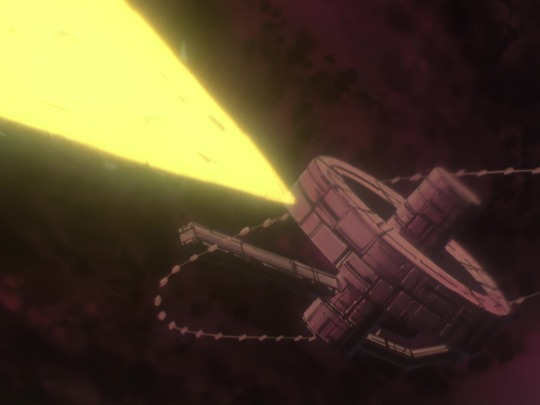
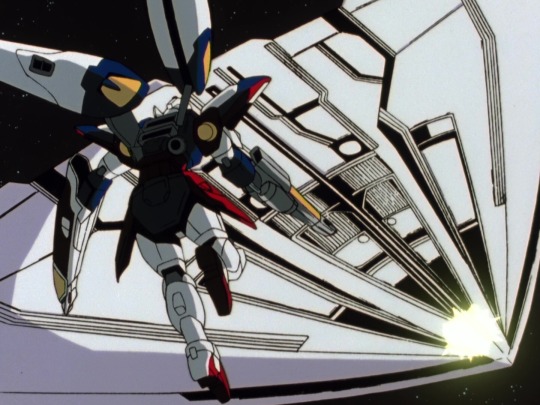
- ----------------- -
The scientists responsible for creating ZERO knew what a monstrosity it was that they had built, and did not implement it in the finalized Gundams. But once it was unleashed on the world anyway, they surmised that the only way to use the system wisely was to become on one’s own terms what ZERO would have tried to force you to become anyway: a soldier with a clearly defined goal, who is strong enough and skilled enough to complete their objectives, and who has nothing holding them back-- therefore, someone who the machine could not easily manipulate.
During their time in space, the Gundam pilots are isolated, scattered, and lack a clear purpose. Their Colonies betrayed them and their loyalties continue to be used against them-- in that atmosphere, the convenience of a system that can select the most advantageous target is obvious, but at the same time, a struggling pilot operating alone is at the greatest risk of being overwhelmed by it. This is why the Doctors advise the pilots to become "perfect soldiers"-- or else, go insane.
Important Clarification: This is a “perfect soldier” in nearly the opposite sense of how the Romefeller Eyebrow Brigade would define a True Soldier! What the Doctors mean by a “perfect soldier” is simply a fighter with a clear objective and few tactical weaknesses that could be exploited.
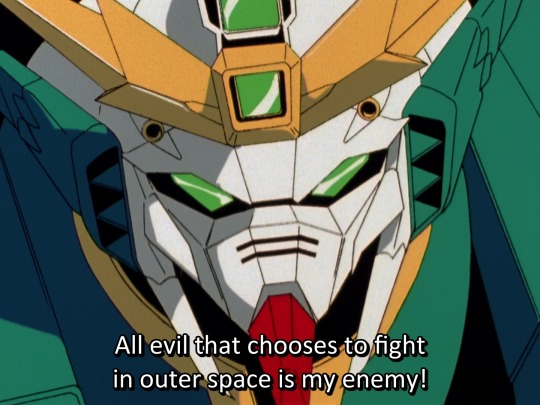
The ideal example of this "perfect soldier" is obviously Wufei:
Wufei already thinks in terms of absolutes; he acts according to the strictest assessment of who is Evil, and therefore an Enemy; he fights almost exclusively alone, relying on his own considerable strength to achieve his goal of enacting justice; and he habitually shuns any close attachment that might complicate his path forward.
It's no wonder that when Wufei pilots the Wing Zero, all the system does is confirm what he already held to be true. His goal was always to eliminate anyone trying to escalate militarism, which means defeating both Treize and Zechs, and as a slight compromise, cooperating with his fellow Gundam pilots as a team.
It’s as though Wufei’s brain was already running on the ZERO system. And since he’s already equipped to make his own tactical decisions in the field, he has no need of an external system to tell him what to do. ZERO has nothing to offer Wufei, and there is nothing for it to exploit.
But it's not just Wufei who can resist using the system: even Quatre-- who is in most ways the polar opposite of Wufei, and who at his lowest point fell prey to the ZERO before anyone realized what it was-- is eventually able to master the system. Once Quatre is armed with the knowledge of what the system is intended for and knows exactly who he has to fight, he is able to use it in a way that maximizes his natural tactical abilities, and resists all its negative effects. And upon gaining ZERO's insight, Quatre realizes that he, too, no longer needs it.
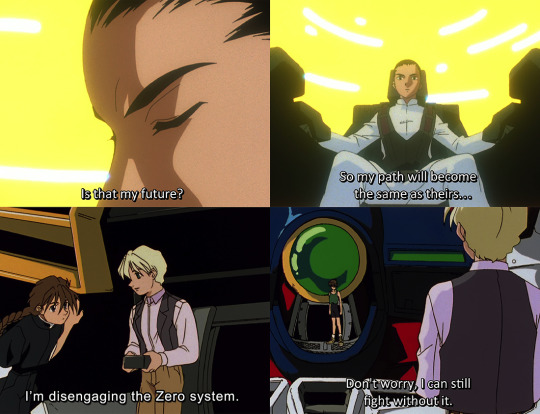
- ----------------- -
So what it boils down to is this: A pilot with superior skills and a firm resolve can operate effectively without the ZERO system, and a pilot with superior skills an NO firm resolve, or with too many vulnerabilities, will find themselves struggling against it to their detriment.
Either way, it is up to the pilot to navigate the available outcomes presented by their surroundings, and choose the best course of action according to their logic and intuition-- and wouldn't this still be true with NO artificial source of input?
The ZERO system may enhance human abilities by brute force, but the processes it accelerates are already present within the pilot. In fact, it’s hardly more than a limited, mechanically-accelerated version of what the senses and nervous system do already.
Like all current examples of machine learning, it presents the illusion of an objective, autonomous process that can stand in for human input. But it isn’t a true “artificial intelligence”-- and even if it were, it would not “transcend” or replace the need for human input. It is only a means of sorting and arranging data sets that come from humans, and must be interpreted and acted on by humans, in order to have any physical effect.
--We know a lot more about the dangers of algorithms and machine-learning and automation now in the 2020’s than we did in the 1990’s, but between the ZERO system and the Mobile Dolls, I think Gundam Wing did a damn good job of illustrating them.
Ultimately, it is always a human who makes the decisions, and is responsible for the consequences. Surrendering that responsibility to a machine is not only morally reprehensible, it is in fact, not possible– a human built the machine, and a human made use of the machine, and a thousand, thousand collective moments of human decision-making led to whatever outcome the machine facilitated.
The world hasn’t yet arrived at the techno-singularity, either in the present or in A.C.195, and those who are eager to pass the blame prematurely to “AI” are usually those who wish to avoid being held accountable for their actions.
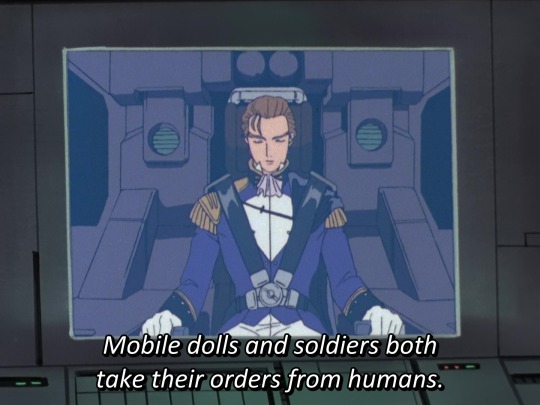
Perhaps it’s a surprise that the only person to use the ZERO system for something other than combat is Treize. For the confined leader of OZ, the system is a magic eight ball to scry the future with.
At the time of creating the Epyon, the system did not show him a viable path forward, or at least, not one he considered acceptable. Treize interpreted this as meaning he had NO future, but I can’t help but wonder if he was asking the wrong sort of question for a predictive battle algorithm to answer.
...Or maybe, the answer he got was “Ask Again Later”, which, actually, would have been correct.
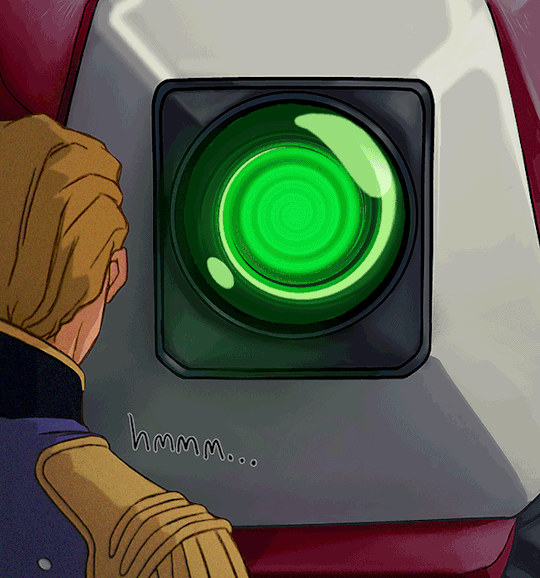
#gundam wing#ZERO system#Wing Zero#read to the end for a surprise!#parsing post#gundam wingtionary#wingwatcher's toolkit#art by me
77 notes
·
View notes
Text
“Act On My Emotions”: Heero’s Motto and What It Actually Means
This sounds like something you’d see on some kitchen decor or a motivational poster at the dentist office, but Heero is not a wine mom, nor is he a dentist. A third, secret thing.
The motto is a reference to yet another scene in Episode Zero, from Heero’s backstory. Odin Lowe, the assassin of Original-Flavor Heero Yuy (politician), and barely-qualifying surrogate parent to Heero Yuy (code name), tells baby!Heero this bit of wisdom right before fucking off and abandoning the kid to his own devices.
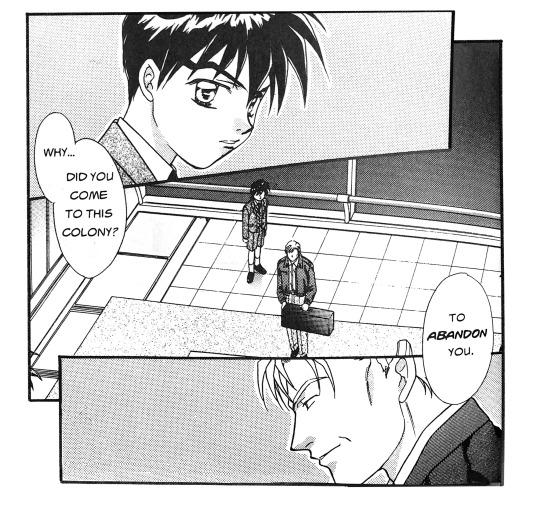
It’s the parting life-advice of a hollow, haunted man: You never know when some idiot (like me) will pull a trigger somewhere and change the future forever. So you might as well “act on your emotions” – or in another phrasing, “do as your heart tells you”.
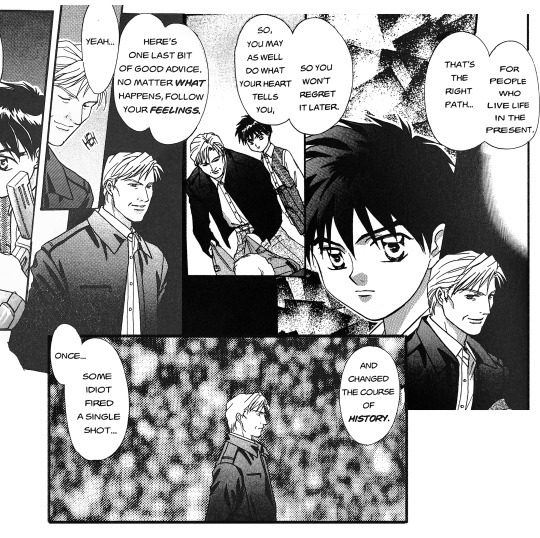
Literally: live in the moment. Act in the moment. Know what it is you value, so you can make snap judgments without wasting time on doubt, or fear, or questions, or trying to guess the endless repercussions of your actions– because you can’t. The future is always up for grabs, anyone could die at any second.
Don’t think about what comes after. Focus on the thing you need to do now, in order to keep living (“my enemy is anyone after my life…”). Don’t let anyone else make decisions for you (“… and anyone that toys with my life”). It’s the only way for someone with no future to maintain a kind of moral compass. It’s the only way to gain some control over your empty, rootless life.
When you’re a disposable resource, you don’t get to think about a higher meaning.

Just do what your heart tells you. Kid.
#Gundam Wingtionary#Wingwatcher's Toolkit#parsing post#tinyozlion pgw#A short and straightforward one - with big repercussions of course#Odin Lowe
18 notes
·
View notes
Text
The Gundam Wing-tionary: What They Say vs. What They Mean
You’ve probably noticed that the characters in Gundam Wing frequently repeat certain Meaningful Words– words that, diegetically, cover several distinct meanings that you will need to be able to decode.
It’s unfortunate that between the necessity of fitting syllables to lip-flaps and the perils of translating concepts from one cultural understanding to another, one sometimes ends up sounding like you’re trying to transcribe the works of Machiavelli using a six-word vocabulary. Despite this, if you can solve for “x" in a given dialogue, the decoded content of what is being said is remarkably sophisticated.
The simplistic vocabulary of Gundam Wing has sometimes been brought up as proof that its handling of heavy topics is sophomoric and overreaching. While I absolutely understand that it’s a piece of pop culture and not the product of a great political essayist or philosopher, I object on principle to the idea that using simple language to discuss complex topics makes the discussion less meaningful, or that pop culture isn’t a viable medium for those discussions.
More than 20 years after it aired, the writers and directors of Gundam Wing still cite it as some of their best work that they’re most proud of. Hell, Sumisawa keeps writing semi-canonical fanfic for his own series just because he’s into it and has more to say! The creators were given a blank slate to tell a story with war as a backdrop, and they took that opportunity to explore challenging questions about subjective morality, ethics, and human nature, which they intentionally leave unresolved. It invites us to make our own assessment of the various ideologies and their outcomes.
Sometimes you have to trust that what you’re hearing can be taken seriously, if you let it be.
Ultimately, it is up to the viewer to interpret the validity of what is being said, but it helps to have a basic Gundam-to-English dictionary to decipher WHAT is being said.
8 notes
·
View notes